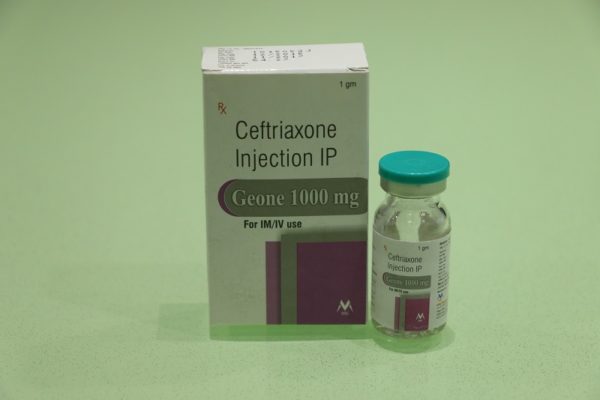GEONE-1000
COMPOSITION: CEFTRIAXONE 1000 MG
- Description
- Reviews (0)
- Description
Be the first to review “GEONE-1000”
Ceftriaxone is a third-generation cephalosporin antibiotic. Like other third-generation cephalosporins, it has broad spectrum activity against Gram positive and Gram negative bacteria. In most cases, it is considered to be equivalent to cefotaxime in terms of safety and efficacy. Ceftriaxone is often used (in combination, but not direct, with macrolide and/or aminoglycoside antibiotics) for the treatment of community-acquired or mild to moderate health care-associated pneumonia. It is also a choice drug for treatment of bacterial meningitis. In pediatrics, it is commonly used in febrile infants between 4 and 8 weeks of age who are admitted to the hospital to exclude sepsis. The dosage for acute ear infection in the very young is 50 mg/Kg IM, one dose only. It has also been used in the treatment of Lyme disease, typhoid fever and gonorrhea.
Ceftriaxone binds to one or more of the penicillin-binding proteins (PBPs) which inhibits the final transpeptidation step of peptidoglycan synthesis in bacterial cell wall, thus inhibiting biosynthesis and arresting cell wall assembly resulting in bacterial cell death.
Absorption: Peak plasma concentrations after 2 hr (IM).
Distribution: Distributed widely into body tissues and fluids; CSF (therapeutic concentrations). Crosses the placenta and enters breast milk; bile (high concentrations). Protein-binding: 85-95%.
Excretion: Via the urine (40-65% as unchanged); via the bile to the faeces (remainder as unchanged and microbiologically inactive compounds); 6-9 hr (elimination half-life).
Superinfection; anaphylaxis; diarrhoea; local reactions; blood dyscrasias; rash, fever, pruritus; elevated transaminases and alkaline phosphatase; leucopenia, neutropenia.
Potentially Fatal: Pseudomembranous colitis; nephrotoxicity.
History of penicillin allergy; severe renal impairment; pregnancy and lactation; superinfection.
Disulfiram-like reaction with alcohol.
Potentially Fatal: Nephrotoxicity with aminoglycosides and furosemide.







Reviews
There are no reviews yet.